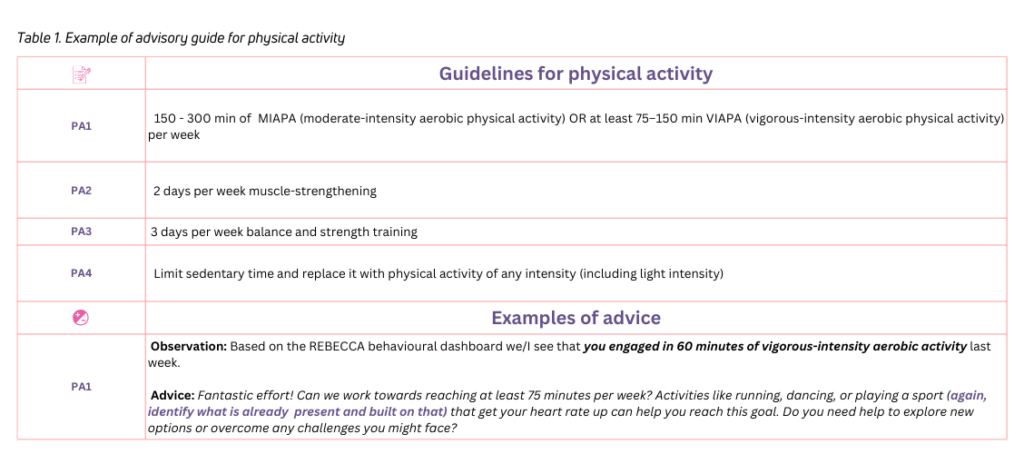Personalised Post-Cancer Consultations: Unified Guidelines & Standards by Karolinska Institutet
At the core of the REBECCA project lies the mission to provide personalised advice, using real-world data to improve patients’ follow-up and their quality-of-life, after their primary treatment. Towards this goal, the project, during the planned intervention studies, will support personalised lifestyle counselling meetings with patients, where the advice offered is tailored to their individual needs, based on real-world data collected by the REBECCA system.
To support this effort, Karolinska Institutet created a comprehensive advisory guide* to serve as a practical and training tool to be used by all the clinical sites of the project, guiding local health personnel on how to provide (and report) personalised guidance to patients. The overall goal for the creation of this guide was to create a common reference framework across all centres, providing guidance according to international and local guidelines, and exemplifying ways that the consultation can be performed.
In May 2023, KI performed a wide literature review focusing on post-cancer lifestyle guidelines, using resources such as the World Health Organization, the World Cancer Research Fund and the Centers for Disease Control and Prevention. These were breast cancer-specific when available, more general when not and complemented with recommendations and guidelines from local resources. The provided guidelines were then aggregated across six crucial lifestyle areas, known to impact the health and the quality of life of breast cancer survivors, as well as their treatment outcomes. These lifestyle domains included: diet, physical activity, sleep, alcohol use, tobacco use, and emotional/mental health. Going beyond conventional methodologies, these guidelines were then translated into a specific list of recommendations relevant to the list of REBECCA-specific real-world data indicators, including categories like daily mobility, return to work after treatment, social relationships and social support systems, dietary habits and eating behaviours.
This thorough investigation led to the development of a comprehensive document coding international and national guidelines and recommendations for breast cancer survivors in relation to the REBECCA system data collection capabilities. The advisory guide not only outlines these guidelines but also provides practical examples demonstrating effective communication in addressing challenging aspects of patients’ lives based on the data collected. Additionally, it offers guidance on potential proposed improvements for individualised, domain-specific (e.g., physical activity), challenges, using a user-friendly and standardised format (Table 1). Additionally, to support seamless and cross-center treatment reporting, the list includes coded references that can be used when health professionals report their patient interactions.

To summarise, the creation of this advisory guide is a deliberate effort to provide a consistent and standardised approach and establish a unified framework that can be adopted by all consortium partners implementing the intervention studies. By doing so, we aim to alleviate the burden on consulting professionals, enabling them to provide advice based on a shared foundation of evidence-based practices and compatible with national and international recommendations.
* The advisory guide is currently not accessible to the public. It has been exclusively distributed to consortium partners for their feedback, and it is slated to be included in upcoming deliverables.
